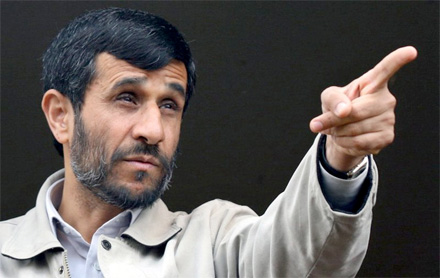
If there is anyone who must apologize to the Iranian people, it is first and foremost Mahmoud Ahmadinejad and his four year regime of economic collapse, corruption, executions and more suppression of Iran’s civil society activists.
Like most Iranians but only more so, I have lived with the sad history of US and the British involvement in the coup against the democratically elected government of Dr. Mohammad Mossadeq. In many ways, our history either begins with Cyrus the Great or Mossadeq. The latter is very dear to me, not just because my fa ther was his personal attorney, but because the more I read about him and his vision for Iran, the more I believe in the democratic values he upheld: a free press, an independent country based on social justice involving a fair distribution of wealth. Like many Iranians, I wish that history could be reversed.
But the Islamic regime is far from all of that, especially under Ahmadinejad’s presidency. Almost four years ago, just returned from Iran after seeing the bad, the good and the ugly under the Islamic regime, I had the misfortune of going to the Hilton in New York City and attending Ahmadinejad’s speech to the “wonderful Iranians living in the US.” He had just been elected as president. Anyone with the slightest inkling of how the officials of this regime behave could see right through him. One could hear the ramblings of a street-smart fellow, a preacher engaged in demagoguery rather than a statesman ready to lead his country’s administration. When I got up and asked Mr. Larijani, now speaker of Majlis and then head of Iran’s nuclear program, why not a single street or an alley bore the name of the man who dedicated his life to defending his nation against the British and the U S, he reluctantly said “Mossadeq is in our hearts,” and in the next breath uttered the name of Ayatollah Kashani.
Iranians know how history unfolded: Kashani, a cleric who would become Khomeini’s idol, turned his back on Mossadeq and, by all accounts, collaborated with the coup organizers. In fact, he was one of the first to congratulate the corrupt government that emerged from Mossadegh’s overthrow. A highway in Tehran is named after him. There is a street in the name of Bobby Sands, who was a member of the Irish Republican Army and even E.G. Browne, the famous British Orientalist who sympathized with the Iranian constitutionalists, But not a single little alley in all of Iran bears the name of Mohammed Mossadeq. The Shah and, subsequently, Khomeini and the Islamic Republic were always scared of his long shadow cast by his legacy in the form of his continued popularity among many Iranians.
Thus, when Ahmadinejad speaks of “60 years of US crimes in Iran” and the coup against the nationalist regime, he sounds less than authentic. He and his regime have never uttered the name of the man responsible for the oil nationalization, whose government was in fact toppled for that reason. Ahmadinejad keeps using old-style rhetoric to enflame people’s sentiments against the US and to rally them behind his failed economic and social programs. His pre-election campaign rhetoric, “a man of the people” is now just an empty slogan. His administration has included some of the most corrupt and criminal people since the inception of the Islamic regime.
As Ahmadinejad knows full well, during the Clinton Administration, Secretary of State Madeleine Albright did apologize to the Khatami government for the US role in the coup. I believe that apology was sufficient and should have been accepted. But we all know that the regime in Tehran has lived by and uses such rhetoric and crisis making to shout that everything is the fault of the US or their British counterparts. There are historical instances where both countries interfered in Iran’s affairs. Especially under Republican administrations, the U.S. has done major damage to US- Iran relations. Yet no one can deny that in Iran, the most fundamental rights have been violated by the Islamic regime rather than the Americans or the British. Iranian journalists, students, and women activists are indiscriminately harassed and incarcerated by the Islamic authorities, not by foreign governments. The same holds true for the recent shutting down of Shirin Ebadi’s office.
We must therefore take responsibility for our own actions and deeds and not blame “foreign agents” for all the malaise in our society. This begins with the recognition that if it were not for the involvement of Iranians, the 1953 coup would never have succeeded.
If there is anyone who must apologize to the Iranians people it’s the current regime in Tehran, having inflicted unprecedented harm to the nation for thirty years now. Today, it is trying to erase evidence of what is perhaps its most heinous crime, the execution of thousands of prisoners without trial, by destroying Khavaran Cemetery, the mass burial site of these hapless victims.
President Obama has offered the olive branch without preconditions, and I do think he means it— even if the regime in Tehran m ay want to believe otherwise.
The people of the United States elected a new president, and have demanded change. Once the Iranians choose a new president in June, the regime should put aside the old slogan of “Marg bar America” (Death to America) and turn a new page as well. I believe both peoples deserve a change of attitudes, and need it more than ever. It is time for Iranians and Americans to welcome a new relationship between the US and Iran based upon mutual respect, friendship, economic benefit and cultural exchange. The tit for tat must stop. The past is only lessons in history. It is time for a fresh start in the long and murky US-Iran relationship.






